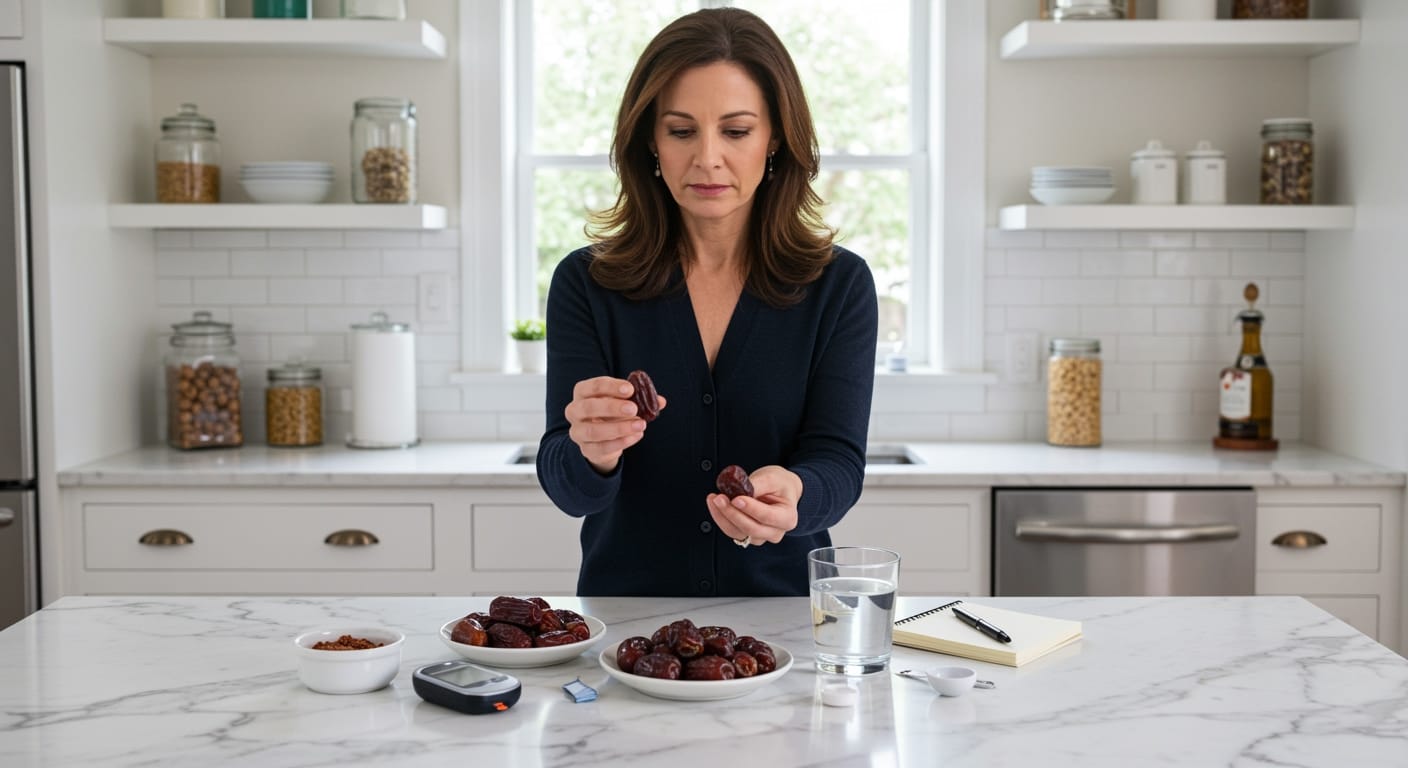✪ Key Takeaway: Dates can be safely consumed by diabetics in small portions when eaten with protein or fiber to slow sugar absorption.
Introduction
Your doctor just told you that you have diabetes, and now you are staring at your favorite box of dates wondering if you can ever enjoy them again.
You might be asking this question because dates taste incredibly sweet, and you have heard that diabetics should avoid sugar completely.
Hi, I am Abdur, your nutrition coach, and today I am going to explain whether dates are safe for diabetes and how you can include them in your diet without spiking your blood sugar.
What Makes Dates So Sweet?
Dates contain approximately 80% sugar by weight, which explains their intense sweetness.
The main sugars in dates are glucose, fructose, and sucrose.
When you eat a date, these sugars enter your bloodstream at different rates.
Glucose gets absorbed directly into your blood within 15-20 minutes, causing a rapid spike in blood sugar levels.
Fructose takes a different pathway and gets processed by your liver first before affecting blood sugar.
Sucrose breaks down into glucose and fructose in your small intestine, creating a dual impact on your blood sugar.
This combination of sugars means dates can cause both immediate and delayed blood sugar responses in diabetic individuals.
✪ Fact: Two Medjool dates contain the same amount of sugar as one can of regular soda.
How Do Dates Affect Blood Sugar Levels?
Dates have a glycemic index ranging from 35 to 55, depending on the variety.
This means they cause a moderate rise in blood sugar compared to pure glucose, which has a glycemic index of 100.
However, the glycemic load tells a more complete story about how dates affect your blood sugar.
A single Medjool date has a glycemic load of approximately 18, which is considered high for people with diabetes.
When you eat dates, your pancreas releases insulin to help cells absorb the glucose from your bloodstream.
In diabetic individuals, this process does not work efficiently, leading to prolonged elevated blood sugar levels.
The fiber content in dates provides some protection by slowing down sugar absorption, but it is not enough to prevent blood sugar spikes completely.
✪ Pro Tip: Test your blood sugar 2 hours after eating dates to understand your personal response.
Can Diabetics Eat Dates Safely?
Yes, diabetics can eat dates, but portion control is absolutely critical.
The key is limiting yourself to one small date or half of a large Medjool date per serving.
Eating dates with protein or healthy fats significantly slows down sugar absorption.
Try pairing a small date with a handful of almonds or a tablespoon of natural peanut butter.
The protein and fat create a buffering effect that prevents rapid blood sugar spikes.
Timing also matters – eating dates after a balanced meal is safer than consuming them on an empty stomach.
Your digestive system processes the sugars more slowly when other nutrients are present, giving your body time to manage the glucose load effectively.
✪ Note: Always consult your healthcare provider before adding dates to your diabetic meal plan.
What Are The Benefits Of Dates For Diabetics?
Dates provide several nutritional benefits that can support overall health in diabetic individuals.
They contain significant amounts of potassium, which helps regulate blood pressure and supports heart health.
The fiber in dates promotes healthy digestion and can help stabilize blood sugar levels when consumed as part of a balanced meal.
Dates also provide antioxidants like flavonoids and phenolic compounds that may help reduce inflammation in the body.
These compounds work at the cellular level to protect against oxidative stress, which is often elevated in people with diabetes.
The magnesium content in dates supports proper insulin function and glucose metabolism.
However, these benefits only apply when dates are consumed in moderation as part of a well-planned diabetic diet.
✪ Fact: Dates contain more potassium per serving than bananas, supporting heart health in diabetics.
Which Types Of Dates Are Best For Diabetics?
Deglet Noor dates are generally better for diabetics than Medjool dates because they are smaller and contain less sugar per serving.
Fresh dates have a lower glycemic impact compared to dried dates because they contain more water and less concentrated sugar.
Avoid dates that have been processed with added sugars or syrups, as these will cause more dramatic blood sugar spikes.
Look for organic dates without preservatives or artificial additives that might interfere with blood sugar management.
The ripeness of dates also affects their sugar content – slightly firmer dates typically contain less concentrated sugars than very soft, overripe ones.
When shopping, choose dates that feel plump but firm and avoid those that appear crystallized or overly sticky.
Store dates properly in the refrigerator to prevent further sugar concentration and maintain their nutritional profile.
✪ Pro Tip: Choose Deglet Noor dates over Medjool varieties for better blood sugar control.
The Bottom Line
Dates can be safely included in a diabetic diet when consumed in small portions and paired with protein or fiber-rich foods.
Remember, moderation is not just about quantity – it is about creating harmony between your cravings and your health goals.
I would love to hear about your experience with dates and diabetes management, so please share your questions or feedback in the comments section below.
At NutritionCrown, we use quality and credible sources to ensure our content is accurate and trustworthy. Below are the sources referenced in creating this article:





